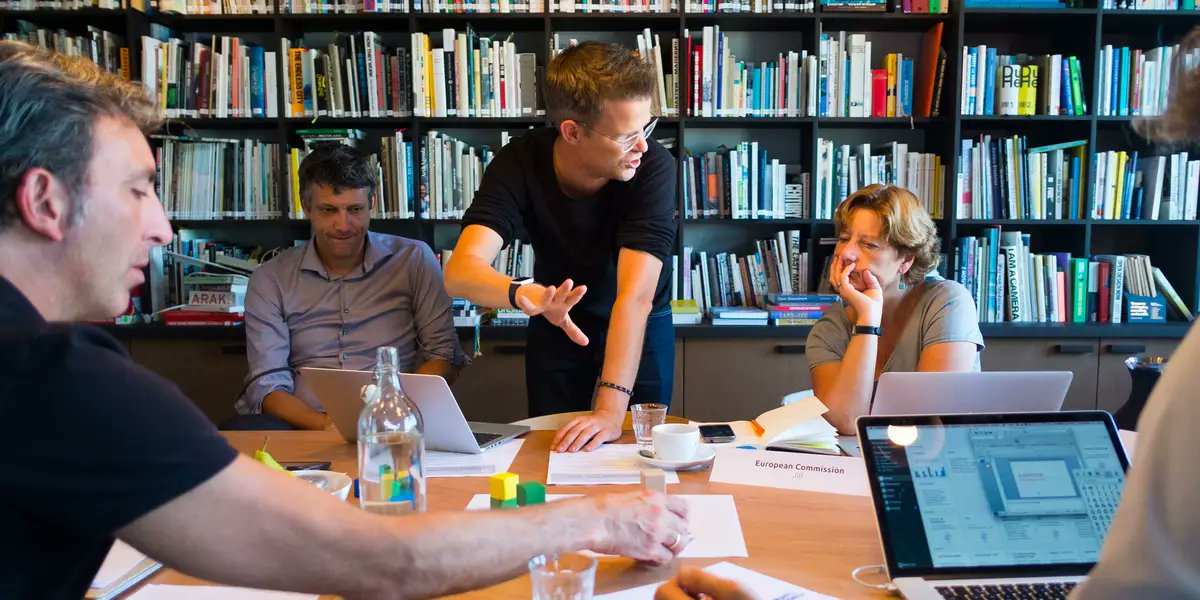
Senior writer at Hidden Brain. Author of 'The Extended Mind'; also 'Origins' and 'The Cult of Personality.'
How to get URL link on X (Twitter) App



 that "the largest predictor of collective intelligence is a group’s collaboration process." Effective groups—remote OR in-person—do the following two things:
that "the largest predictor of collective intelligence is a group’s collaboration process." Effective groups—remote OR in-person—do the following two things:
 As Jay Mathews of the Washington Post writes, Lemov introduces the acronym STAR:
As Jay Mathews of the Washington Post writes, Lemov introduces the acronym STAR:
 But awe can be inspired by more modest encounters with nature, Pearson reminds us. "Co-operating with the natural order produces within us a sense of awe by putting us in touch with things beyond our daily frame of reference," he writes.
But awe can be inspired by more modest encounters with nature, Pearson reminds us. "Co-operating with the natural order produces within us a sense of awe by putting us in touch with things beyond our daily frame of reference," he writes.

 —and this has led, she tells Ayoub, "to an increase in innovation around products that are intentionally designed and marketed to support fidgeting."
—and this has led, she tells Ayoub, "to an increase in innovation around products that are intentionally designed and marketed to support fidgeting."

 This shift, which is also found in non-human animals, makes evolutionary sense: the visual system becomes more sensitive when we are actively exploring our environment. When our bodies are at rest—that is,
This shift, which is also found in non-human animals, makes evolutionary sense: the visual system becomes more sensitive when we are actively exploring our environment. When our bodies are at rest—that is,
 "Researchers recommend that we implement a specific sequence of actions in response to our teammates’ contributions: we should ACKNOWLEDGE, REPEAT, REPHRASE, AND ELABORATE ON what other group members say.
"Researchers recommend that we implement a specific sequence of actions in response to our teammates’ contributions: we should ACKNOWLEDGE, REPEAT, REPHRASE, AND ELABORATE ON what other group members say.

 But I think we all know that confidence doesn't always equal accuracy! Hence the importance of what the researchers (Philip Tetlock and two others) call "collective confidence calibration."
But I think we all know that confidence doesn't always equal accuracy! Hence the importance of what the researchers (Philip Tetlock and two others) call "collective confidence calibration."

 Studies of groups laboring on a shared task—from students programming a robot to surgeons performing an operation—show that the members of effective
Studies of groups laboring on a shared task—from students programming a robot to surgeons performing an operation—show that the members of effective
 Research has found that we recall as much as *50
Research has found that we recall as much as *50
 In place of what was mostly speculation on Carr’s part, there is now a booming field of empirical research into exactly HOW and WHEN and WHY our encounters with technology influence our thinking.
In place of what was mostly speculation on Carr’s part, there is now a booming field of empirical research into exactly HOW and WHEN and WHY our encounters with technology influence our thinking. 
 Simply making a conceptually-congruent gesture while they’re learning about the concept helps clarify and reinforce the concept—forming a second channel of instruction that’s independent of the verbal one.
Simply making a conceptually-congruent gesture while they’re learning about the concept helps clarify and reinforce the concept—forming a second channel of instruction that’s independent of the verbal one. 
 Researchers led by UVA psychologist Sophie Trawalter recently examined the relationship between students' socioeconomic status and their use of iconic public space. Lower-SES students were less likely to feel that they belonged in these spaces, and less likely to use them. 2/8
Researchers led by UVA psychologist Sophie Trawalter recently examined the relationship between students' socioeconomic status and their use of iconic public space. Lower-SES students were less likely to feel that they belonged in these spaces, and less likely to use them. 2/8

 Benjamin Meagher, a psychologist at Kenyon College, recently published a paper in which he examined the relationship between college students' psychological well-being and the degree of "place identity" they experience in regard to their housing.
Benjamin Meagher, a psychologist at Kenyon College, recently published a paper in which he examined the relationship between college students' psychological well-being and the degree of "place identity" they experience in regard to their housing. 
 Anthony Wing Kosner recently published an article about the extended mind, featuring an interview with Clark. It includes a number of gems—such as Clark's suggestion that the isolation imposed by the pandemic has driven us further into what he calls "brainbound" thinking.
Anthony Wing Kosner recently published an article about the extended mind, featuring an interview with Clark. It includes a number of gems—such as Clark's suggestion that the isolation imposed by the pandemic has driven us further into what he calls "brainbound" thinking. 
 "They solve them through the coordinated manipulation of both internal and external representations”—like sketches, models, and even hand gestures. But the instruction we offer students fails to develop the outside-the-brain thinking skills used by real-world experts.
"They solve them through the coordinated manipulation of both internal and external representations”—like sketches, models, and even hand gestures. But the instruction we offer students fails to develop the outside-the-brain thinking skills used by real-world experts. 
 "They solve them through the coordinated manipulation of both internal and external representations”—like sketches, models, and even hand gestures. But the instruction we offer students fails to develop the outside-the-brain thinking skills used by real-world experts. 2/7
"They solve them through the coordinated manipulation of both internal and external representations”—like sketches, models, and even hand gestures. But the instruction we offer students fails to develop the outside-the-brain thinking skills used by real-world experts. 2/7

 Research previously found that SYNCHRONY among group members—the alignment of non-verbal behaviors—promotes collective intelligence. You might think that synchrony would be easier to achieve when members can see each other—but in fact such visual cues act as distractions. 2/8
Research previously found that SYNCHRONY among group members—the alignment of non-verbal behaviors—promotes collective intelligence. You might think that synchrony would be easier to achieve when members can see each other—but in fact such visual cues act as distractions. 2/8

 After the British House of Commons was severely damaged by German bombs in 1941, Winston Churchill weighed in on plans for the reconstruction of the building, writes the book's co-editor, Thomas Kvan, in an introductory essay. 2/8
After the British House of Commons was severely damaged by German bombs in 1941, Winston Churchill weighed in on plans for the reconstruction of the building, writes the book's co-editor, Thomas Kvan, in an introductory essay. 2/8

 An interesting new paper by Matthew Fisher and Daniel Oppenheimer in Psychological Science looks at what happens when our mental work is augmented by technological resources—say, using spellcheck to correct our writing. 2/8
An interesting new paper by Matthew Fisher and Daniel Oppenheimer in Psychological Science looks at what happens when our mental work is augmented by technological resources—say, using spellcheck to correct our writing. 2/8